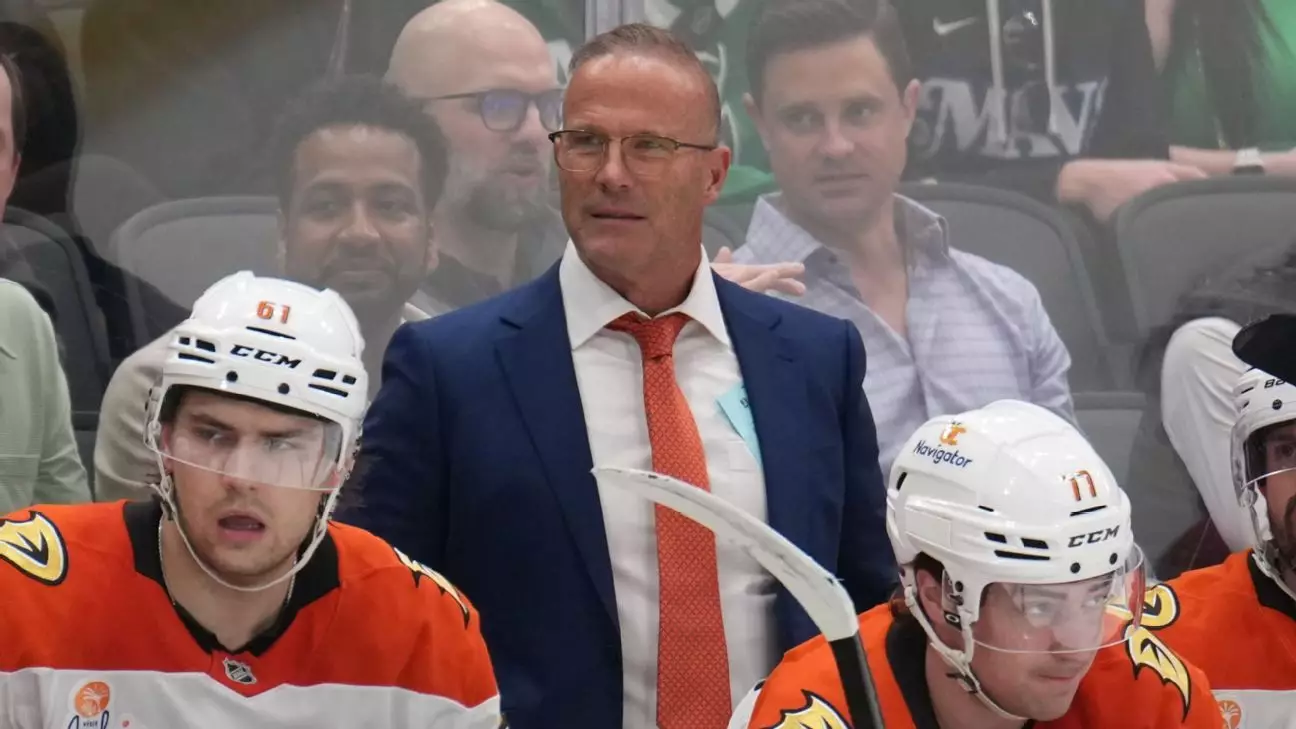In a significant move for the franchise, the Anaheim Ducks announced on Saturday that Greg Cronin will not return as head coach for the upcoming season. His departure marks a pivotal moment in the team’s quest to revitalize its performance and carve a path back to playoff contention. Despite an improved record of 35-37-10 during Cronin’s tenure, which saw the Ducks garner 80 points—a notable leap from last season’s abysmal 27-50-5—these gains were viewed as insufficient to secure his continued leadership.
The Ducks’ ongoing struggle to reach the playoffs for the seventh consecutive year underscored a pressing need for change. Cronin, who was initially infused with hope when hired in June 2023, may have found himself as a steadfast captain navigating a ship in turbulent waters. His coaching experience with the AHL’s Colorado Eagles may have not translated into the success necessary at the NHL level, leading to a reevaluation of strategies within the franchise.
General Manager’s Vision for Reform
Pat Verbeek, the Ducks’ general manager, emphasized the reasoning behind this difficult decision, highlighting the need for „a new voice“ to inspire the team. His statement reflects a clear ambition to mold the team into a Stanley Cup contender, shedding light on the dichotomy of past performance versus future potential. Verbeek’s comments evoke a subtle promise for fans: change is essential for progress, and invigorating the leadership may unlock the dormant talent within the team.
Verbeek’s intention to push the team toward playoff aspirations adds a refreshing level of accountability and ambition within the Ducks’ organization. His assertion that the team is on course for improvement suggests a calculated optimism in a franchise that has experienced its fair share of trials and tribulations. However, the challenge for the Ducks now is to deliver on those promises by finding a capable successor for Cronin, one who can effectively harness the energy of younger players and translate potential into performance.
Assessing the Team’s Performance
The Ducks’ performance under Cronin raised eyebrows, especially when focusing on defensive capabilities. Ranking 23rd in team defense, the Ducks struggled despite respectable numbers from goalies Lukas Dostal and John Gibson, who combined for a .901 team save percentage—an impressive 9th in the NHL. It brings into question not only the coaching strategy but the effectiveness of player deployment and game tactics that may have stifled offensive opportunities.
Cronin faced criticism for his reluctance to elevate the ice time of emerging talents, such as Leo Carlsson, Mason McTavish, and rookie winger Cutter Gauthier. Instead, the reliance on established players, like Troy Terry and Alex Killorn, seemed to inhibit the potential growth of a new generation of players. This raises concerns about Cronin’s adaptability in leveraging the youth that other franchises seem to prioritize, a misstep that could have contributed to his dismissal.
The Need for a New Approach
As the search begins for Cronin’s successor, the Ducks stand at a crossroads. The franchise must urgently determine the kind of leadership that will best complement its evolving roster. Potential candidates must not only have a proven track record but also possess a deep understanding of how to integrate young players into the NHL fabric.
Interestingly, the challenge lies not just in finding a coach who adheres to traditional practices but one who can innovate while instilling the necessary discipline and structure. As Verbeek enters this new phase of decisiveness, the Ducks‘ future will hinge on whether this new leader can harness the enthusiasm of youth while striking a balance with seasoned players.
Looking Ahead with Hope
The Ducks are undeniably at a tipping point. With fresh aspirations and an evolving roster, they have the potential to transition from a struggling team into a competitive force in the NHL. While Cronin’s exit is emblematic of past frustrations, it also signals a fresh beginning. The voice that will replace him must encapsulate a vision that extends beyond simple statistics and delivers a culture of success, resilience, and camaraderie—qualities necessary for any team aiming for the coveted Stanley Cup.
The road ahead may be fraught with uncertainty, but it also brims with possibility. Fans remain invested in the promise of transformation, keen to see the next chapter of the Anaheim Ducks unfold with the vigor that has been elusive for far too long. As they embark on this journey, one thing remains clear: the power of change is in their hands, and the time for action is now.


Napsat komentář